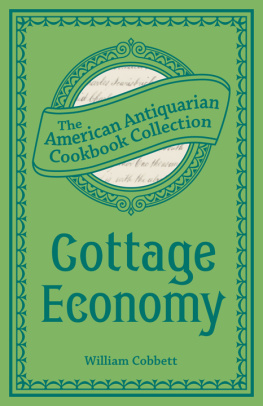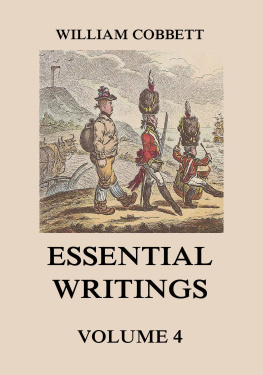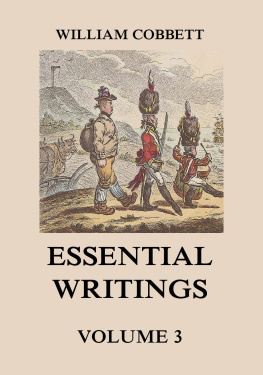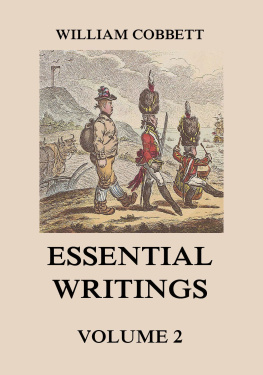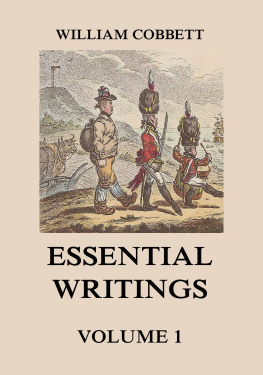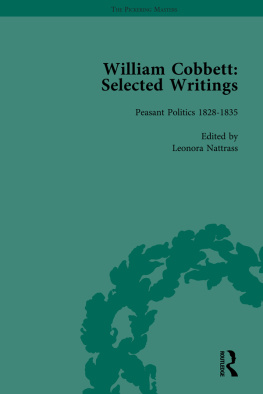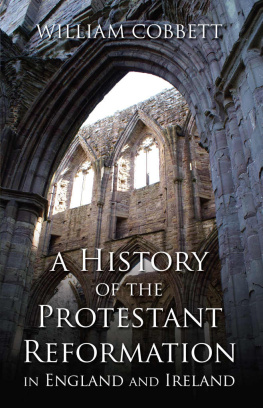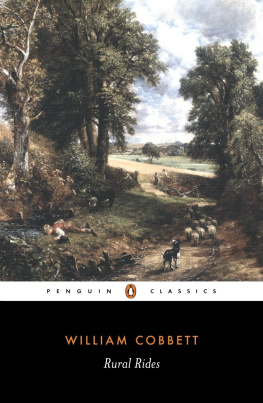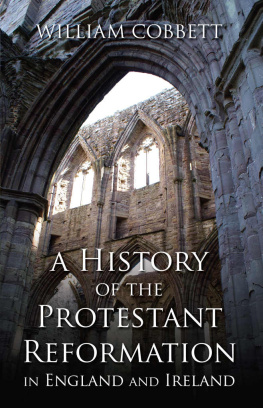

OTHER BOOKS IN
THE AMERICAN ANTIQUARIAN SOCIETY
COOKBOOK COLLECTION
American Cookery, by Amelia Simmons
The Canadian Housewifes Manual of Cookery
The Compleat Housewife, by Eliza Smith
The Cook Not Mad
Dainty Dishes, by Lady Harriet E. St. Clair
Dairying Exemplified, by Josiah Twamley
Fifteen Cent Dinners for Families of Six, by Juliet Corson
The Hand-Book of Carving
How to Mix Drinks, by Jerry Thomas
Jewish Cookery Book, by Esther Levy
Miss Leslies New Cookery Book, by Eliza Leslie
Mrs. Owens Illinois Cook Book, by Mrs. T.J.V. Owen
Mrs. Porters New Southern Cookery Book, by Mrs. M.E. Porter
The New England Cook Book
The Physiology of Taste, by Jean A. Brillat-Savarin
The Times Recipes, by The New York Times
A Treatise on Bread, by Sylvester Graham
Vegetable Diet, by William Alcott
What to Do with the Cold Mutton

This edition of Cottage Economy by William Cobbett was reproduced by permission from the volume in the collection of the American Antiquarian Society (AAS), Worcester, Massachusetts. Founded in 1812 by Isaiah Thomas, a Revolutionary War patriot and successful printer and publisher, the Society is a research library documenting the life of Americans from the colonial era through 1876. AAS aims to collect, preserve, and make available as complete a record as possible of the printed materials from the early American experience. The cookbook collection includes approximately 1,100 volumes.
Cottage Economy copyright 2012 by American Antiquarian Society. All rights reserved. No part of this book may be used or reproduced in any manner whatsoever without written permission except in the case of reprints in the context of reviews.
Andrews McMeel Publishing, LLC
an Andrews McMeel Universal company
1130 Walnut Street, Kansas City, Missouri 64106
www.andrewsmcmeel.com
ISBN: 978-1-4494-2829-7
ATTENTION: SCHOOLS AND BUSINESSES
Andrews McMeel books are available at quantity discounts with bulk purchase for educational, business, or sales promotional use. For information, please e-mail the Andrews McMeel Publishing Special Sales Department:
specialsales@amuniversal.com
ADVERTISEMENT TO THIS EDITION.

T HE following work was recommended to the publishers by Mr. G RANT T HORBURN, well known as having long since been the principal Seedsman and Florist in the city of New-York. Relying solely upon his judgment, in which they had the most implicit confidence, it was undertaken without even a perusal on their part. Upon a critical examination of the work subsequently, they were convinced that it deserved even more than the high recommendation which Mr. Thorburn gave it. It is a little instructor in domestic economy, which ought to be possessed by every family, whether occupying a Cottage or a Mansion; and however much the pride of our countrywomen may scorn instruction upon subjects which relate to what ought to be their daily occupation, still, it is asserted, without fear of contradiction, that there is not a cottagers wife, a housekeeper, or a family directress in the nation, who will not be much instructed in many, if not all, the subjects treated on in this little family Manual.
Notwithstanding the public charge Mr. Cobbett with great versatility in political matters, they deem it but rendering him a fair meed of praise, in giving it as their opinion, he has been of greater advantage to this nation in developing its resources, by his various treatises, and illustrating them by practical proof, than any foreigner who has ever resided in our country.
CONTENTS.

COTTAGE ECONOMY.
No. I.

INTRODUCTION.

To the Labouring Classes of this Kingdom.
1. T HROUGHOUT this little work, I shall number the paragraphs, in order to be able, at some stages of the work, to refer, with the more facility, to parts that have gone before. The last number will contain an index, by the means of which the several matters may be turned to without loss of time; for, when economy is the subject, time is a thing which ought, by no means, to be overlooked.
2. The word economy, like a great many others, has, in its application, been very much abused. It is generally used as if it meaned parsimony, stinginess, or niggardliness; and, at best, merely the refraining from expending money. Hence misers and close-fisted men disguise their propensity and conduct under the name of economy; whereas the most liberal disposition, a disposition precisely the contrary of that of the miser, is perfectly consistent with economy.
3. E CONOMY means management, and nothing more; and it is generally applied to the affairs of a house and family, which affairs are an object of the greatest importance, whether as relating to individuals or to a nation. A nation is made powerful, and to be honoured in the world not so much by the number of its people as by the ability and character of that people; and the ability and character of that people depend, in a great measure, upon the economy of the several families, which, all taken together, make up the nation. There never yet was, and never will be, a nation permanently great, consisting, for the greater part, of wretched and miserable families.
4. In every view of the matter, therefore it is desirable that the families of which a nation consists should be happily off; and, as this depends, in a great degree, upon the management of their concerns, the present work is intended to convey to the families of the Labouring Classes in particular, such information as I think may be useful with regard to that management.
5. I lay it down as a maxim, that, for a family to be happy, they must be well supplied with food and raiment. It is a sorry effort that people make to persuade others, or to persuade themselves, that they can be happy in a state of want of the necessaries of life. The doctrines which fanaticism preaches, and which teaches men to be content with poverty, have a pernicious tendency, and are calculated to favour tyrants by giving them passive slaves. To live well, to enjoy all things that make life pleasant, is the right of every man who constantly uses his strength judiciously and lawfully. It is to blaspheme God to suppose that he created men to be miserable, to hunger, thirst, and perish with cold, in the midst of that abundance which is the fruit of their own labour. Instead, therefore, of applauding happy poverty, which applause is so much the fashion of the present day, I despise the man that is poor and contented; for such content is a certain proof of a base disposition, a disposition which is the enemy of all industry, all exertion, all love of independence.
Next page
